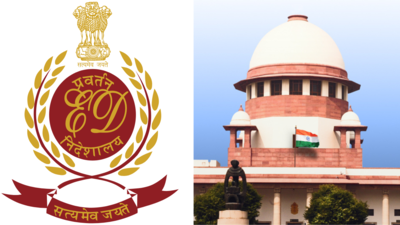NEW DELHI: “They (ED officers) should remember that there is something called Article 21 in the country (which guarantees right to life and liberty),” Supreme Court on Monday told the agency while expressing concern over the way in which PMLA was being implemented and made it clear that any high-handedness against any accused in violation of their fundamental rights would not be allowed.
A bench of Justices Abhay S Oka and Augustine George Masih took exception to the way in which former IAS officer Anil Tuteja was issued summons and arrested in a tearing hurry, and sought an explanation from ED.
The court noted that Tuteja was summoned by ED when he was in the office of Anti-Corruption Bureau, where he was being interrogated, and asked to appear before the anti-money laundering agency. ED issued a second summons a few hours later when he did not appear before it at the time fixed by the agency.
ED in its affidavit earlier told SC that Anil Tuteja and Alok Shukla, two bureaucrats accused in Chhattisgarh’s Nagrik Apurti Nigam scam, “were in touch with the HC judge who granted bail to Shukla” in Oct 2019. The then advocate general, Satish Chandra Verma, had been liaisoning between the two and the judge, ED claimed.
Challenging the arrest for violation of established procedure, senior advocate Abhishek Manu Singhvi contended that Tuteja was taken by ACB officers to the ED office, where he was interrogated the whole night. But additional solicitor general S V Raju, appearing for ED, refuted the allegation and said that he had appeared voluntarily.
“Show us how they came voluntarily. Why should ACB officers accompany them to ED? Please explain to us this procedure. He is in the ACB office when ED issues summons at 12noon and then at 5.30pm. Why is this tearing hurry?” the bench asked the ASG.
Raju submitted that the allegation was very serious and it was not that ED tortured Tuteja — he was simply asked to come. But the bench said that it was not about the seriousness of the offence but the way arrest was carried out. It directed the agency to furnish the time at which summonses against Tuteja were issued and the time at which they were served. The court also sought to know how ED came to know that the accused was in the ACB office.
“If you knew that he was being interrogated in the ACB office, why was the time of 12.30 given? What was the hurry to issue summonses two times when you knew that he was being interrogated by the ACB? This doesn’t happen (even) in the case of terrorism or serious offences in the IPC,” the bench observed.
The court said that it would come down heavily on such practices and the officer concerned should be taken to task.
Raju told the court that the agency had already issued a circular asking its officers not to conduct interrogation at odd hours. The court thereafter asked him to file an affidavit on the manner in which he was arrested.
At the end of the proceedings, the bench said in a lighter vein that judges are also human beings and they see every day the way in which PMLA law is being implemented, perhaps hinting at recent verdicts of the apex court through which some stringent provisions of the anti-money laundering law had been diluted.
